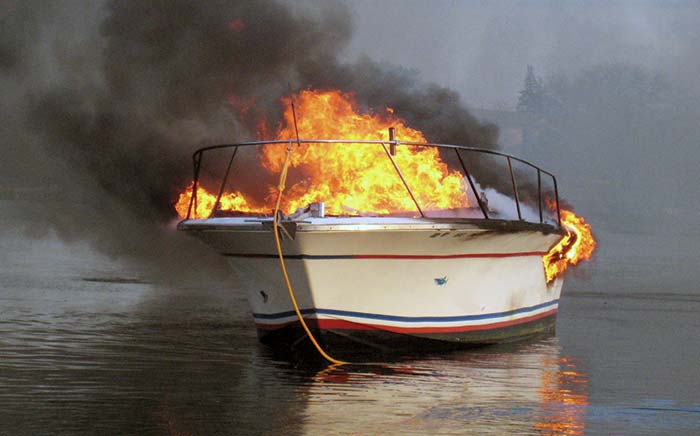
Wreck Removal
Hurricanes, other wind and weather events, fire, explosions, and sinking could also destroy the boat beyond repair, leaving behind only a wreck. Most people assume their insurance company will cover the cost of cleaning up what's left. But some insurance companies will give you a check for the insured value plus a specified percentage (5% to 10% of the insured value is typical) and walk away, leaving you to pay for the wreck removal and to arrange it. If removal is required by law or governmental authority, the most generous policies cover wreck removal out of the liability coverage and will pay up to the liability limit (usually $100,000 or more) to clean up the mess.
Boats don't just get wrecked on shoals. They can also be destroyed by sinking, fire, and extreme weather. So four out of the top five items on our list could involve wreck removal.
Fuel-Spill Liability
Again, it pays to read the fine print to understand what you are — or are not — getting. Some policies pay the cost of cleaning up a fuel spill only if it occurs due to a "covered loss." So if your sunken boat wasn't covered because the stuffing box failed due to wear, tear, and corrosion, the resulting fuel spill wouldn't be, either.
Some policies pay fuel-spill liability out of the overall liability limit for the policy, and it is lumped together with other liability payments. So if you have a collision that injures someone and the contents of your gas tank end up in an environmentally sensitive area, the payment for both the injury and the spill will come out of the same pool of money.
Liability
If you're already insured, it costs very little to increase your limits, so it's worth checking how much liability coverage you have and comparing it to your auto and homeowner's policies.
Uninsured because your boat isn't worth that much? You're leaving yourself open to a six-figure settlement if someone gets injured in a collision or while skiing off your boat. Shop around for a liability-only policy just to see what it would cost; you might be pleasantly surprised. But make sure you're comparing apples to apples by taking a good look at the policy language before purchasing. The most comprehensive liability-only policies cover not just personal injury but also medical payments, uninsured boaters coverage, salvage, wreck removal, and fuel-spill liability.
When it comes to insurance, you get what you pay for. If you compare only the premium rates when you're shopping for boat insurance, you may feel let down if you ever have to file a claim.